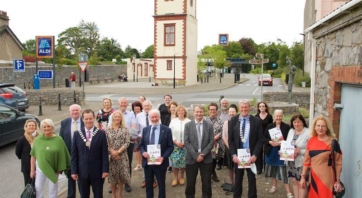
Collaborative Town Centre Health Check Programme
A trans-disciplinary Collaborative Town Centre Health Check Programme which was carried out in conjunction with participating towns across the country.

2009
The framework assesses current knowledge and research of this amazing UNESCO World Heritage Site and proposes a strategy for future research with a view to its sustainable management.
The framework assesses current knowledge and research of this amazing UNESCO World Heritage Site and proposes a strategy for future research with a view to its sustainable management.
Brú na Bóinne – the Bend in the Boyne – has been an important ritual, social and economic centre for thousands of years. It is internationally renowned for its elaborate Neolithic passage tombs and contains the largest assemblage of megalithic art in Europe. In 1993 it was designated a UNESCO World Heritage Site, one of only three on the island of Ireland.
In 2009 the Heritage Council in partnership with the Irish government’s National Monuments Service published the Brú na Bóinne Research Framework project in accordance with World Heritage Site best practice.
The framework consists of:
World Heritage Sites are vast storehouses of information on human and natural history. The knowledge acquired from researching Brú na Bóinne contributes to awareness, appreciation and understanding, all of which are vital ingredients of sustainable management.
The framework document compiled by the Heritage Council in liaison with local groups, the Irish university and state sectors, as well as the wider heritage community, was the first of its kind for Ireland and is only one of four in existence worldwide, Orkney, Avebury and Stonehenge in the UK being the other three published examples.
A considerable body of research has been completed including large scale excavations at Newgrange and Knowth, field surveys, analysis of the megalithic art and discussion of the landscape of the site.
The Brú na Bóinne Research Framework publication provides an illustrated and comprehensive history of excavation and research at this fascinating site in the context of this new framework. Featuring valuable references and scientific data, the 150 page document is illustrated with historical and modern photography, drawings and maps.

A trans-disciplinary Collaborative Town Centre Health Check Programme which was carried out in conjunction with participating towns across the country.

The programme is run in partnership with the Chester Beatty Library, the National Gallery of Ireland, the National Library of Ireland, The National Archives and Trinity College Dublin.

An annual grants scheme funded by the Department of Agriculture, Food and the Marine for the conservation and repair of traditional farm buildings and related structures.
This scheme is funded under the transitional arrangements of the 2014-20 Rural Development Programme - the Agricultural Fund for Development in Europe (n+3).